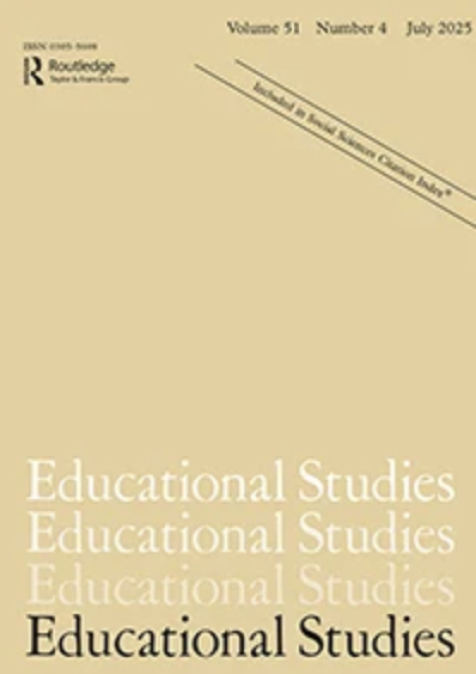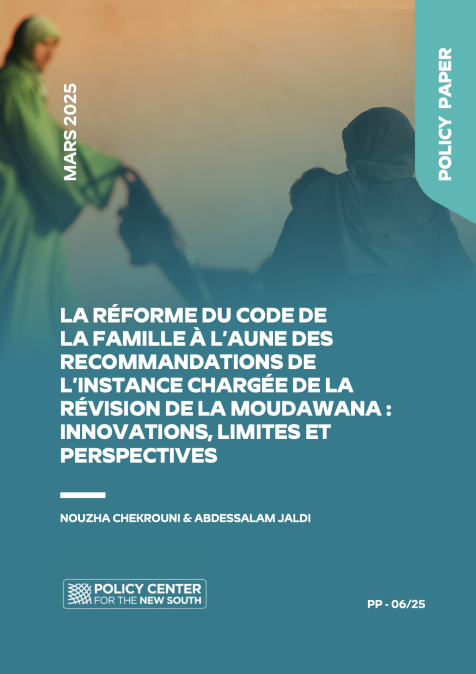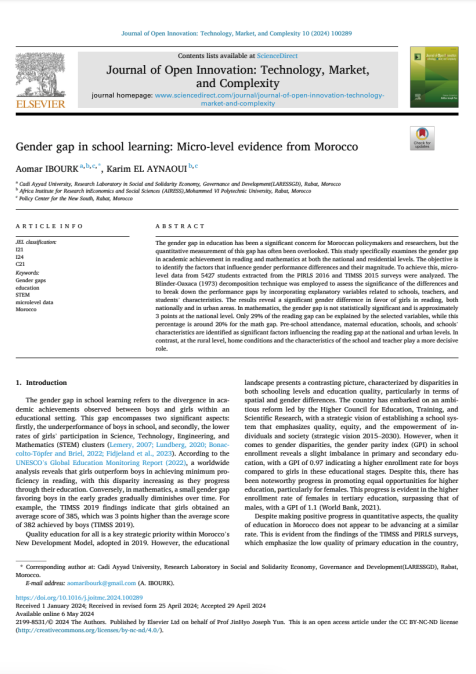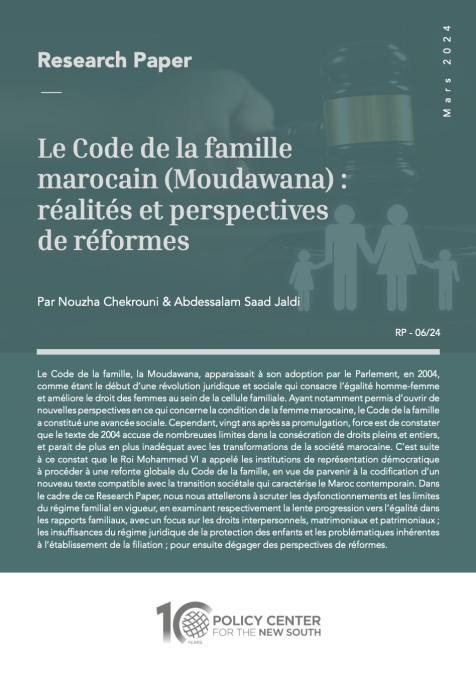Publications /
Opinion
When I think about women’s empowerment, I see it as a constant process of attaining milestones in our lives as individuals man and woman, and as society. When I think of women’s empowerment in the context of Morocco, a host of questions come to mind. First, how is the ‘Moroccan woman’? In other words, to what extent are Moroccan women seeking to empower themselves? Does empowerment, mean the same thing to every Moroccan woman? To what extent is it self-empowerment? And what are the roles of individuals, civil society, and government in empowering women in a diverse land of paradoxes? In this article, I attempt to frame my perspective on women’s empowerment in contemporary Morocco. I look briefly into some policy measures that highlight the importance of empowering women, though this is by no means an attempt to summarize or analyze policymaking on this issue. I examine the issue through a socio-cultural lens, ending with some thoughts on where we stand today on the path towards the empowerment of Moroccan women.
INCREASED MOMENTUM DRIVING THE EMPOWERING OF WOMEN: A GLIMPSE INTO THE POLICY AGENDA
The women’s empowerment agenda has gained momentum over the past decade. At the international level, achieving gender equality and empowering women and girls remains an enduring goal of the 2030 Agenda for Sustainable Development, unanimously adopted by 193 United Nations member states. The 2030 agenda follows the Millennium Development Goals and previous key milestone agreements on gender equality, including the Beijing Declaration and Platform for Action (1995) and the Convention on the Elimination of All Forms of Discrimination against Women (1979). At national level, the Parliament of Morocco adopted the Family Code in 2004. This reform of Moroccan family law sought to put in place a modern vision of women’s empowerment by focusing on a range of areas including combatting gender-based violence, gender-mainstreaming, social and economic empowerment and education to facilitate the empowerment of vulnerable and marginalized women. The 2004 Act established in particular the right to divorce by mutual consent, placed limits on polygamy and raised the minimum marriage age for women to 18 from 15. No changes were made with respect to inheritance. However, at the civil society level, there is a growing network of non-governmental and grassroots organizations and a vibrant movement advocating for gender equality and women’s rights in Morocco.
Yet it is only in recent years that a national strategy has been outlined supporting women’s rights and community representatives in mobilizing gender equality.
EXAMINING IMPLEMENTATION GAPS: A SOCIO-CULTURAL LENS
A critical aspect is how as a country, as a community, as a nation and as families, we believe in the empowerment and respond to the idea and the policies advancing it. The universal necessity of empowering women is confronted by the complex diversity of a nation composed of 35 million people, 12 regions, two official national languages and more than 6 dialects, along with a varying set of sub-cultural, religious, and customary behavioral codes. A girl from a urban Moroccan city, such as Casablanca or Rabat, as a different starting point in the conversation of social and economic empowerment compared to a girl from a rural Moroccan town, or and a girl from a tribal area of Morocco. And these examples represent only three points on a broad spectrum of the diverse group not only the ‘Moroccan woman’ and the ‘Moroccan society’. Even within these points, one can find variations that are a product of multiple socio-cultural and economic factors. For instance, for some women, empowerment may begin with having a voice in the household, for others; it might entail attaining financial independence that complements their level of education.
Social discrimination against girls and women, unequal access to education and health services, entrenched cultural biases and violence against women continue to pervade Moroccan society. The gender gap in literacy rates is shrinking, though slowly pace, the participation of women in the workforce is rising steadily, and Moroccan women are assuming leadership and decision making roles. At the same time, many challenges persist—from the high incidence of gender based-violence, to inadequate political representation of women.
Morocco has examples of successful businesswomen, including entrepreneurs at local-level although they have undoubtedly faced their own share of challenges. But, there are also cases of villages banning single women from studying or owning cell phones. Morocco is poised to welcome women into roles in a male-centric policy world and combat roles in the military, while there are still cases of widows being abandoned by families.
These continuing challenges serve as a sobering reminder of the need for a shift in social attitudes, legal enforcement and policy implementation. It is imperative to bridge the gap between policy, law, and practice. For example, The Violence Against Women Act, adopted by the Parliament in 2018, includes positive provisions, such as a definition of violence against women as meaning “any act based on gender discrimination that entails physical, psychological, sexual, or economic harm to a woman”. But it also requires survivors to file for criminal prosecution to obtain protection, which few can do, and it does not criminalize marital rape. In other words, the Act of 2018 provides protections but contains gaps that should be addressed. Nevertheless, it is important to acknowledge success stories and the positive changes that continue to take place, and to make them into symbols to spur more optimism and determination.
PLANET 50-50 BY 2030: STEPPING IT UP FOR GENDER EQUALITY
Gender equality is the key theme for Morocco’s future. The larger question we should be asking ourselves is: how can we empower every Moroccan woman in a context of socio-cultural and economic variations and paradoxes? I would like to address this question with three thoughts:
1)- A targeted approach should be adopted that recognizes these contrasts, in order to tailor strategies to each context to help address the needs of all women across the spectrum, rather than enforcing “one-size-fits-all” approaches. Indeed, reframing citizenship from a gender perspective has important consequences in the private and social spheres and can overcome the Women/Man divide by combating exclusion from rights on the basis of gender.
2) Women’s empowerment should be promoted not only as a right, but also as a shared social good that benefits women as individuals, and also benefits the concentric circles of their families, their communities and society as a whole. Such an approach would provide the impetus for everyone to participate in this achievement. In other words, women’s empowerment is not only a question of laws, but is also a citizenship education project. It would be useful to propose educating young boys in order to initiate a profound structural change in terms on gender understanding. A survey carried out by UN Woman in 2018 found that 40% of men in Morocco thought that women deserve to be beaten[1].
3)- Awareness-raising measures should be adopted. For example, on violence against women, a government survey of women aged 18 to 65 in Morocco found that 62.8% had experienced physical, psychological, sexual, and economic violence. Of the sample interviewed, 55 percent reported “conjugal” violence and 13.5 percent reported “familial” violence[2].
The national authorities should provide specialized units to serve the needs of urban and rural women in courts, government agencies, and security forces. There should also be local, regional, and national committees to address women’s and children’s issues. It should be acknowledged that women’s empowerment is closely linked to other fundamental rights, most notably protection to the legal, political, economic and cultural rights.
Thought a great distance has been traveled already, we still have miles to go. I would like to end with a personal example. I was born in a middle-class Moroccan family. My parents took pride in raising my sister Sarah—a single girl child, without feeling the need to have a boy to “complete” the family, in a cultural context in which it is desirable to have a male child to “carry on the family legacy”. Sarah has been fortunate to be raised in such an enabling environment, free to make her own choices and trusted with having the ability to handle the consequences. She can count on unwavering support to chase her dreams and pursue the life she wants, although not aligned with “conventional” and “patriarchal” careers. Her empowerment began with and was nourished by my parents. My hope is that women’s empowerment does not remain a matter of destiny or fortune, but a basic and constant norm for every Moroccan girl.
[1] Telquel. February27th, 2018. 40% des hommes marocains pensent que les femmes méritent d’être battues. https://telquel.ma/2018/02/27/40-hommes-pensent-les-femmes-meritent-detre-battues-etude_1582030
[2] Human Rights Watch. Morocco: New violence against Women Law – Progress, but some gaps; further reform needed. February 26th, 2018. https://www.hrw.org/news/2018/02/26/morocco-new-violence-against-women-law








